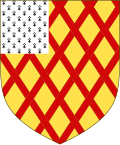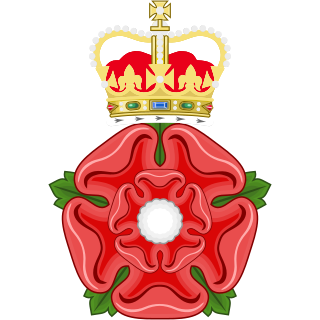Lancaster Herald
From Wikipedia, the free encyclopedia
Lancaster Herald of Arms in Ordinary is an English officer of arms at the College of Arms in London. The title of Lancaster Herald first occurs in 1347 at Calais, and to begin with this officer was a servant to the noble House of Lancaster. As a retainer of John of Gaunt (1377–1399) Lancaster was advanced to the rank of King of Arms, and was later promoted to the royal household of Henry IV (Gaunt's son), and made king of the northern province. This arrangement continued until 1464, when Lancaster reverted to the rank of herald. Since the reign of Henry VII (1485–1509) Lancaster has been a herald in ordinary. The badge of office is a red rose of Lancaster, royally crowned.
 The heraldic badge of Lancaster Herald of Arms in Ordinary | |
| Heraldic tradition | Gallo-British |
|---|---|
| Jurisdiction | England, Wales and Northern Ireland |
| Governing body | College of Arms |

The current Lancaster Herald of Arms is Adam Tuck.
Holders of the office
| Arms | Name | Date of appointment | Ref | |
|---|---|---|---|---|
| Lancaster Herald to the Earl or Duke of Lancaster | ||||
| Herman (surname unknown) | (1354) | |||
| John (surname unknown) | (1358) | |||
| Nicholas (surname unknown) | (1366) | |||
| Roger Durroit. | (1386) | |||
 |
Richard Bruges | (Richard II) | ||
| Lancaster King of Arms in Ordinary | ||||
 |
Richard Bruges | (Richard II) | ||
 |
John Ashwell | (1426) | ||
 |
William Boys | (1436) | ||
 |
William Tyndale | (1447) | ||
| Lancaster Herald of Arms in Ordinary | ||||
| James Collier or Collyer | (Edward IV) | |||
 |
Richard Ashwell | (Edward IV) | ||
| (name unknown) | (1486) | |||
 |
Thomas Wall | 1509–1526 | ||
 |
William Jennings or Jenys[a] | 1526–1527 | ||
 |
William Fellows | 1527–1531 | ||
| Fulk ap Howell[b] | 1531–1536 | |||
| Thomas Milner[c] | 1536–1538 | |||
| Nicholas Tubman | 1553–1559 | |||
 |
John Cocke | 1559–1588 | ||
 |
Nicholas Paddy | 1588–1602 | ||
 |
Francis Thynne | 1602–1609 | ||
 |
Nicholas Charles | 1609–1613 | ||
 |
William Penson | 1613–1637 | ||
 |
Thomas Thompson | 1637–1641 | ||
 |
William Ryley | 1641–1658 | ||
 |
George Barkham | 1658–1660 | ||
 |
William Ryley | 1660–1665 | ||
 |
Robert Chaloner | 1665–1676 | ||
 |
Francis Sandford | 1676–1689 | ||
 |
Gregory King | 1689–1712 | ||
 |
Rowland Fryth | 1712–1713 | ||
 |
John Hesketh | 1713–1727 | ||
 |
Stephen Leake | 1727–1729 | ||
 |
Charles Greene | 1729–1743 | ||
 |
Thomas Browne | 1743–1761 | [5] | |
 |
Sir Isaac Heard | 1761–1774 | ||
 |
Thomas Lock | 1774–1781 | ||
 |
Charles Townley[d] | 1781–1793 | ||
 |
Edmund Lodge | 1793–1822 | [6] | |
 |
George Frederick Beltz | 1822–1841 | [7] | |
 |
Sir Albert Woods | 1841–1869 | [8] | |
 |
George Edward Cokayne | 1870–1882 | [9] | |
 |
Edward Bellasis | 1882–1922 | [10] | |
 |
Archibald Russell | 1922–1954 | [11] | |
 |
John Walker | 1954–1968 | [12] | |
 |
Sedley Andrus | 1972–1982 | [13] | |
 |
Sir Peter Gwynn-Jones | 1982–1995 | [14] | |
 |
Robert Noel | 1999–2021 | [15] | |
| Adam Tuck | 2023–present | [16] | ||
See also
References
External links
Wikiwand - on
Seamless Wikipedia browsing. On steroids.
